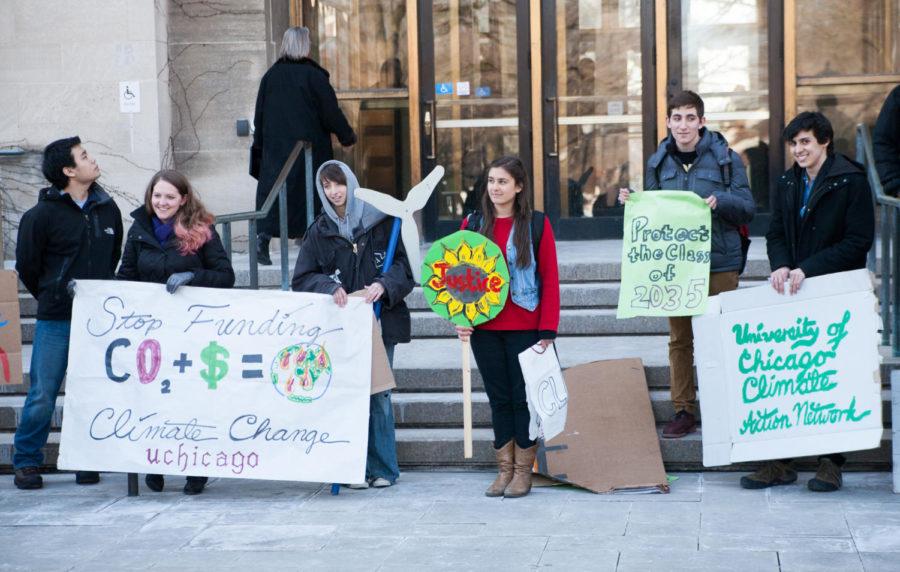For years, UChicago has voiced its commitment to environmental sustainability. Now, a student-run campaign is calling on the University to take what they see as a necessary next step to fulfilling this goal: cutting its financial ties with industries that contribute to planet-warming fossil fuels.
Members of the student activist group Environmental Justice Task Force (EJTF), a branch of the umbrella organization UChicago Student Action, hope the University will join the ranks of Harvard, Yale, Brown, Columbia, and other universities in divesting its $10 billion endowment from stocks that keep the oil, gas, and coal industries financially viable.
“We are all actively threatened by the effects of climate change,” EJTF wrote in a campaign petition, which has amassed 40 signatures. “As students, faculty, and staff of the University of Chicago, we demand that our institution take this clear and concrete step to protect us and all of humanity.”
Seeing a window of opportunity with the retirement of the University’s longtime Chief Investment Officer, Mark Schmid, EJTF’s student organizers are arguing that divestment is the logical next step in the University’s commitment to sustainability. Last year, UChicago announced its goal to halve its greenhouse gas emissions by 2030, which would keep it on pace with the schedule laid out in the Paris Climate Agreement.
The group is demanding that the University divest from fossil fuels within five years, with the goal of eventually investing only in companies that have achieved carbon neutrality. According to EJTF co-organizer Felix de Simone, this would be complementary to its existing sustainability goals.
“It’s not an ideological issue. It’s just about [asking], ‘How can we improve our financial decisions as an institution to reflect the needs—both short- and long-term—of our university community?’ And the fact is that the University community, along with the rest of the human species, is going to be deleteriously affected by unmitigated climate change,” de Simone said.
The specter of the unsuccessful “Stop Funding Climate Change” campaign from the early 2010s, when activists previously pushed for divestment, still hangs over the organizers. At the time, then-president Robert Zimmer said that the Board of Trustees, which oversees the endowment, was “unlikely” to divest. According to Zimmer, such a decision was consistent with the 1967 Kalven Report, which recommended that the University maintain political neutrality on matters of the day in the interest of protecting free speech.
Student organizers are optimistic that times have changed since then. The current campaign comes during a watershed moment for the global movement to divest from fossil fuels. Harvard University’s decision to divest in September of this year prompted a cascade of similar announcements from other institutions, including Boston University, the University of Minnesota, and the MacArthur Foundation. To date, global investment funds valued at a collective $40 trillion have committed to abstinence from coal, oil, and gas stocks—more than the Gross Domestic Products of the U.S. and China, combined.
“We’re re-entering into a very exciting time. We’re riding the coattails of several major divestment announcements from universities across the country. It’s a really different space from what it was in 2015 or 2016,” said Joe Geniesse, another ETJF organizer.
Concerns about climate change are pushing the world economy toward decarbonization, meaning that investments in fossil fuels are likely to become stranded assets in the not-too-distant future. In light of this, Geniesse said, “part of our argument is a financial one: that the long term sustainability of the endowment itself would be benefitted from divestment.”
The group also frames its activism as part of a broader push for the University to be more transparent about its budget and endowment. The petition also demands the regular disclosure of the University's finances and holding a community “stakeholder referendum” including students, faculty, and staff to set “ethical and environmentally just” guidelines for the University’s future investment decisions.
Currently, the student organizers’ plans include circulating the ongoing petition, holding a teach-in on the merits of divestment, and, they hope, engaging in dialogue with University administrators.









